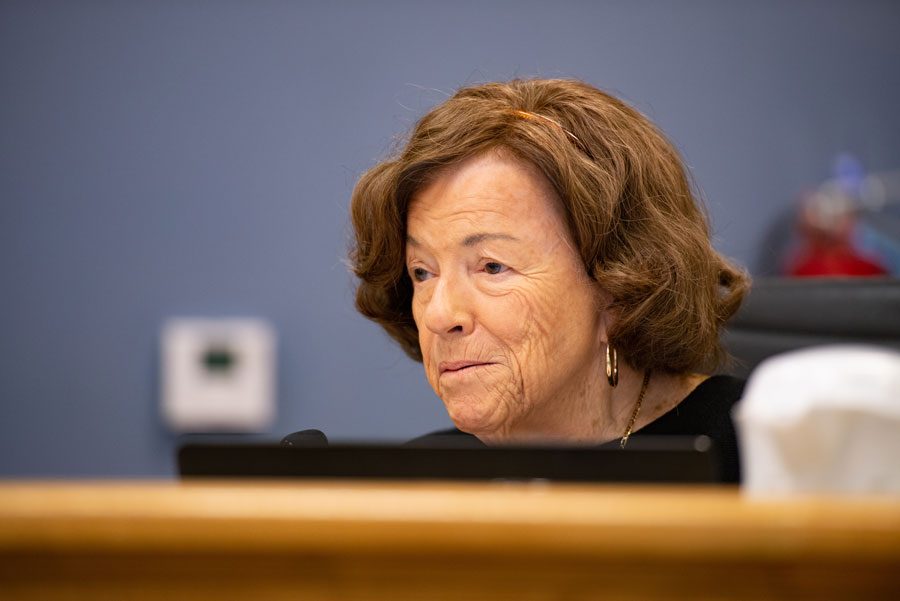Ahead of council vote, a look back at the city’s ethics reform
Daily file photo by Noah Frick-Alofs
Ald. Ann Rainey (8th) at a City Council meeting. Ordinance proposed in the wake of ethics complaints filed against the alderman will be voted on Monday by council.
November 10, 2019
A City Council vote Monday will deliver the final verdict on almost a year’s worth of deliberation about Evanston’s ethics code.
Aldermen will vote on an ordinance to overhaul the rules governing the city’s Board of Ethics. The 18-page proposal restructures and rewrites significant portions of the code.
The final ordinance closes the loophole allowing elected officials to vote on their own ethics complaints and adds a special counsel role — replacing the role of city attorneys — in the board process. The ordinance empowers the special counsel to initiate ethics investigations on their own volition, with the approval of the Board of Ethics’ chair.
City Council retains the authority to determine action against elected and appointed officials found in violation, while penalties against employees will be handled by the city manager’s office.
The proposed ordinance also shortens the term lengths of board members from three to two years.
The ethics code attracted public discussion last December after Ald. Ann Rainey (8th) cast a tie-breaking vote ending council deliberations on her own ethics violations, effectively blocking herself from censure. The following January, the Rules Committee founded a new subcommittee and charged the group with revising rules and procedures surrounding the board.
Rainey under fire
Beginning in August 2018, multiple citizens filed two separate complaints with the Board of Ethics against Rainey, charging her with a half-dozen acts of misconduct related to ongoing discussions over the future of the Harley Clarke mansion.
The complaints alleged Rainey violated rules regarding the city’s impartiality clause and that she engaged in prohibited activity, including lobbying on behalf of private individuals and using city resources to do so. Documents showed Rainey aided a group lobbying for demolition of the Harley Clarke Mansion.
The complaints also asserted that Rainey intimidated residents, citing an instance where the alderman said “f–k you” to a complainant during a public meeting and later privately told that same person “don’t mess with me.”
Seven counts, including two relating to her alleged lack of impartiality, were ultimately filed against Rainey. In November 2018, the board found Rainey in violation on three of those counts. Rainey had violated impartiality in two cases, one for disparaging comments included with emails she forwarded to the demolition group and one for her profane and threatening statements. The board also found Rainey abused her power by attempting to fundraise for the demolition group.
The board’s verdict constituted an advisory opinion: a formal verdict, like censure, would have to come from City Council.
At the Dec. 3 Rules Committee meeting, Rainey cast the deciding vote in a 5-4 verdict, placing the board’s finding on file and effectively halting all further action. The board had previously advised Rainey should recuse herself from voting on her own case, and Rainey did not participate in discussion prior to the vote.
The night of the vote, Ald. Cicely Fleming (9th) lamented a lack of clarity surrounding the current code.
“Unfortunately, now I think we’re in a space where we realize that in hindsight, so shame on us,” Fleming said.
Making an ordinance
In January 2019, the Rules Committee established the Ethics Subcommittee and charged it with reviewing portions of the city code relating to the Board of Ethics.
The Rules Committee named several preliminary issues for the subcommittee to consider, including use of profanity in public meetings, rules surrounding ethics violations and unspecified lobbying issues. Chaired by Ald. Donald Wilson (4th), the committee produced several drafts to rewrite the City Code chapter on the Board of Ethics.
The board was not included in producing these drafts and received a draft of the ordinance only after submitting a written request to the committee.
The board characterized the ordinance as “rushed,” criticized the subcommittee for excluding the board from the drafting process and suggested the board was better poised to rewrite the city code. They also submitted an annotated edit of the current ordinance.
Wilson declined to go into specifics when asked at the time about the board’s recommendations.
“They had a lot of comments,” Wilson told The Daily. “I can’t characterize their response. I just appreciate they spent time on it.”
The Board of Ethics has not responded to subsequent requests for comment.
The subcommittee held its last meeting in September and sent the final draft of the ordinance to the Rules Committee. The committee made several further edits before the ordinance was introduced to City Council on Oct. 28, including setting the maximum fine City Council could enact against officials at $750.
Despite past contention, the ordinance was introduced at City Council without discussion.
Email: [email protected]
Twitter: @maybejoshirvine












